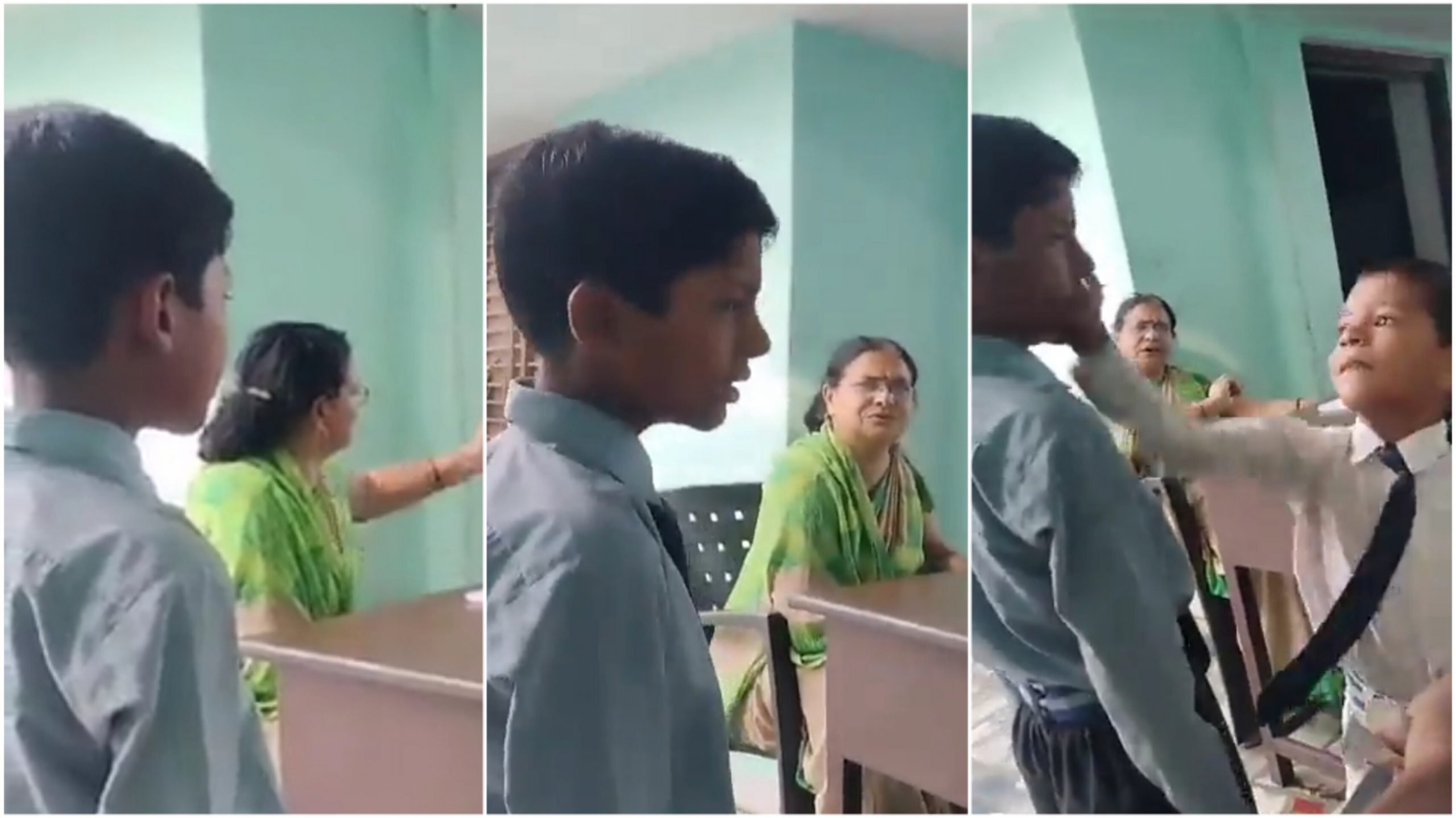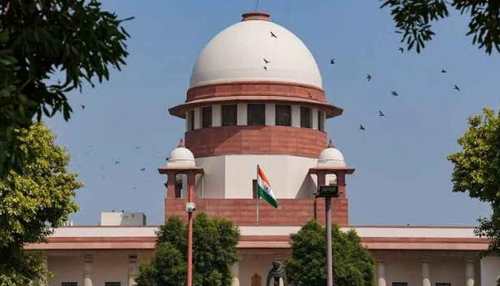Supreme Court’s Pronouncement Prompts Reckoning: Muslim Student Slap Case in UP

Supreme Court’s Pronouncement Prompts Reckoning: Muslim Student Slap Case in UP
In a landmark ruling that has reverberated across the nation, the Supreme Court of India has ordered a thorough investigation into a harrowing incident that transpired in the heart of Uttar Pradesh‘s Muzaffarnagar. In this incident, a Muslim schoolboy endured a degrading act of humiliation as he was slapped by his fellow classmates, allegedly at the behest of a teacher. The apex court’s verdict not only calls for justice but also sends a resounding message that ought to “shake the conscience of the state.”
The incident, which unfolded within the walls of a school, has ignited a critical dialogue about the principles of equality and justice within India’s educational system. The Supreme Court’s unequivocal stance that “there cannot be…quality education if a student is…penalised only on the grounds that he belongs to a particular community” underscores the gravity of the issue at hand.
This pivotal case has sparked nationwide debates and discussions, raising poignant questions about the role of educators, the environment of inclusivity within educational institutions, and the need for decisive action against discrimination. In this article, we delve into the details of the case, examine the broader implications it carries, and explore the potential for change within India’s educational landscape.
The Shocking Incident
The incident in question unfolded in a school in Muzaffarnagar, a district in the northern state of Uttar Pradesh. A young Muslim student, whose identity remains confidential, was subjected to an act of violence that transcended the boundaries of mere bullying. He was allegedly slapped by his fellow classmates, and the apparent motivation behind this distressing act was purportedly the instruction of a teacher.
The incident came to light through various media reports and eyewitness accounts, drawing the attention of concerned citizens and activists alike. It not only raised questions about the safety and dignity of students but also ignited a wider debate about the role and responsibilities of educators in nurturing a healthy and inclusive learning environment.

The Legal Battle Unfolds
With the incident garnering widespread attention and outrage, it soon found its way into the judicial system. The victim’s family, alongside concerned citizens and activists, filed a petition seeking justice and accountability. The case eventually reached the Supreme Court of India, the country’s highest legal authority.
In a resounding verdict, the Supreme Court emphasized the need for a comprehensive investigation into the incident. The court’s directive was clear: it was imperative to uncover the truth behind this disturbing episode. Furthermore, the court unequivocally stated that the incident should “shake the conscience of the state.” This statement, laden with significance, underscored the gravity of the matter at hand.
The Broader Implications
The Supreme Court’s decision in this case extends beyond a mere legal judgment. It serves as a potent reminder of the fundamental principles that underpin India’s democratic and inclusive ethos. In a diverse and pluralistic nation like India, where citizens of various backgrounds coexist, the principles of equality and non-discrimination are not just ideals but constitutional imperatives.
The incident in Muzaffarnagar reflects a disturbing trend of discrimination on the basis of religion or community within educational institutions. It brings into focus the urgent need to create an educational environment that is free from bias, prejudice, and discrimination. A safe and inclusive atmosphere is not just a matter of moral imperative; it is essential for nurturing young minds and preparing them for a diverse and interconnected world.

Educators as Torchbearers of Change
One of the crucial aspects that this incident has underscored is the pivotal role of educators in shaping young minds and fostering a culture of respect and inclusivity. Teachers are often seen as mentors and role models for their students. Therefore, their actions and behavior carry immense weight.
The allegations that a teacher may have instigated or condoned the act of violence in this case raise serious concerns about the ethical standards within the teaching profession. Educators are entrusted with the responsibility of imparting knowledge, nurturing values, and guiding students toward becoming responsible citizens. Any deviation from these noble objectives not only undermines the educational process but also erodes the trust that society places in teachers.
The Road to Reform
While the Supreme Court’s verdict is a significant step toward justice in this particular case, it also underscores the need for broader reforms within the educational system. The incident in Muzaffarnagar should serve as a wake-up call, prompting educational authorities, policymakers, and society at large to take proactive measures to prevent such incidents from recurring.
Some key areas that require attention include:
1. Sensitization of Educators: Teachers should undergo training and sensitization programs that emphasize the importance of inclusivity, diversity, and respect for all students, regardless of their background.
2. Anti-Discrimination Policies: Educational institutions must implement and enforce stringent anti-discrimination policies that explicitly prohibit any form of bias or prejudice.
3. Student Counseling and Support: Schools should establish robust counseling and support systems to assist students who may face discrimination or bullying. Creating safe spaces for students to share their concerns is essential.
4. Community Engagement: Parents, communities, and civil society organizations should actively engage with educational institutions to ensure transparency and accountability in matters related to discrimination.
5. Curriculum Revision: The curriculum should be reviewed to ensure that it promotes tolerance, diversity, and inclusivity. It should reflect the multicultural fabric of the nation.

Conclusion
The Supreme Court’s verdict on the Muslim student slap case in Uttar Pradesh’s Muzaffarnagar serves as a potent reminder of the core principles that underpin India’s democratic fabric. It emphasizes the need for a just and inclusive society, where discrimination and bias have no place, especially within the educational system.
While this incident has brought to light a distressing episode, it also presents an opportunity for reform and transformation. It calls upon educators, policymakers, and society at large to work collectively toward creating an environment where every student can pursue education without fear of discrimination. In doing so, India can take significant strides toward building a more equitable and harmonious future for all its citizens.
In addition to the legal and educational dimensions, the Muzaffarnagar incident has sparked a robust national discourse on the broader issues of social harmony and communal tensions. It serves as a stark reminder that divisive forces still lurk within the fabric of Indian society. Addressing these deep-seated issues requires not only legal and educational reforms but also a collective effort from civil society, religious leaders, and political leaders.
Religious and community leaders can play a pivotal role in fostering interfaith dialogue and promoting mutual understanding. Their influence within communities can be harnessed to advocate for tolerance and acceptance. Encouraging grassroots initiatives that bring people of different faiths together can help bridge divides and build bridges of trust and solidarity.
Political leaders, on the other hand, have a responsibility to set an example of inclusivity and secularism. They should refrain from using divisive rhetoric that fuels communal tensions and instead focus on policies that promote social cohesion and economic development for all citizens, regardless of their religious or cultural background.
Furthermore, civil society organizations and human rights activists must remain vigilant in their efforts to combat discrimination and uphold the principles of justice and equality. Their role in raising awareness, advocating for policy changes, and providing support to victims of discrimination is invaluable in ensuring that incidents like the one in Muzaffarnagar are not repeated.
In conclusion, the Supreme Court’s directive to investigate the Muzaffarnagar incident should serve as a catalyst for comprehensive change within India’s educational system and society at large. While it exposes the darkness that can lurk within the corridors of schools, it also shines a light on the potential for transformation and progress. By addressing the root causes of discrimination, nurturing a culture of inclusivity, and fostering dialogue and understanding, India can move closer to its ideals of being a nation that celebrates diversity and upholds the principles of justice and equality for all.




